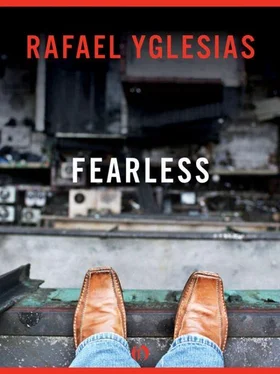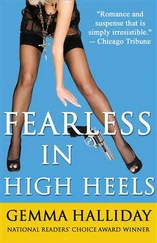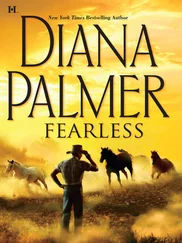From his room Jonah called out: “The dreaded Disguised Meka Turtle.”
“Hi, Jonah,” Max said, looking in. Jonah was sitting only a foot or so from the small television in his room, a set used more for video games than watching programs.
“Hi, Dad,” Jonah said fast and melodiously, as if he were a bird chirping. “Mom’s in the shower. She said to tell you he’ll be here at four.”
“Who?” Max said, wondering at his child’s sudden competence with the world, its errands and relationships.
“Byron,” Jonah said.
“He’s coming here?”
“She said you were expecting him.” Jonah made a helpless hands-up-toward-the-sky gesture — a miniature of one of his mother’s mannerisms. “I don’t know. Anyway that’s the message.”
Jonah was a three-quarter-scale man, freed of Max, and yet always bound to him. Max’s heart ached for him. What will he get out of my survival that my father’s death robbed me of? he thought. Nothing but what living parents bring — harassment, and soon, disillusionment.
“I forgot about it,” Max said. “I don’t want to see him,” he added, almost calling it out to Jonah.
Jonah studied the frozen image on his television screen — a video game paused. He shrugged his shoulders and said, “I don’t blame you.”
“I’d rather do something with you,” Max said, painfully aware of how self-conscious he sounded, perhaps even dishonest to Jonah’s ears, although Max was telling the truth.
“It’s okay,” Jonah said casually. “I’m busy.”
Kenny returned, brushing past Max in a hurry, carrying two glasses of seltzer, spilling them a little. “Magic elixir to kill the Turtle,” Kenny said.
Jonah took one of the glasses and sipped it, watching his father. “Dad…?” he asked after a swallow. He gestured at Max, his mouth open wide, almost pleading.
“What?”
“Do you want something else? We’re playing here. Do you want to watch?”
“Do you want me to watch?” Max asked, feeling as simple as a child.
“I don’t care,” Jonah said.
“Makes me nervous,” Kenny said in a low but audible tone.
“Okay,” Max agreed and left. He returned to the living room and listened to hear if Debby’s shower was still running. It was. They would have to discuss living arrangements. Carla didn’t want him anyway, so why should he move out unless Debby really couldn’t stand him being around? They could maintain the illusion for Jonah, like the joke about the Jewish couple who suffer through sixty-five years of loveless marriage before consulting a divorce lawyer because they wanted to wait until the children were dead.
But if I’m not afraid of death, why should I fear my son’s pain?
The intercom buzzed. The doorman told him Byron was coming up; the front door bell rang a moment later. Byron bustled in with a large portfolio made of handsome black leather, an item so expensive and fine that Max would never have had the nerve to buy it for himself.
“I brought my new design for a shopping mall and a school. They’re really good, I think, and you know what? I think they’re more like your stuff.” Byron had walked into the living room. He knelt beside the large square coffee table (too awkward for the space. Max had told Debby, but she insisted) and was unzipping the case. “I don’t mean they look like your buildings. I mean they could really get built.”
“Why don’t you ask your father to build them?” Max wasn’t sarcastic — he believed Byron’s father had the necessary resources and vanity.
“He doesn’t like my new stuff,” Byron was matter-of-fact. “Well, he sort of likes the school.” Byron let go of the top of the portfolio, allowing its spine to break open, spreading the contents across the entire surface of the table. He lifted one of his computer printouts from the scattered mess. “He says he doesn’t approve of malls. Here’s the school. It’s a high school. This is my really cool idea—” Byron spread himself over the drawing to reach a far corner of it.
“But your father could build them, couldn’t he?” Max went over to the windows, the new single-pane windows that the co-op had put in. They had not been refitted with anything like the seamlessness of Manny’s work. Carla had told Max she was angry at her husband but she was also loyal to him. That was sad for Max and yet in spite of what he should feel about a rival he was struck again by Manny’s skill and meticulousness. Manny had done all that work on their apartment by himself, Carla told Max while they were driving on the Newport Mall’s elevated parking lot. As she explained that Manny had taught himself those skills to be promoted to handyman, Max noticed the vibrations of the mall’s concrete, fairly severe vibrations that were due to shoddy engineering.
Byron explicated his sketches at length, his words blurring together in his excitement. Max seated himself on the windowsill and distanced himself from the boy’s blueprints and his speech. He thought about Manny’s workmanship in Little Italy and resented Byron, resented this child who was being indulged to blow up his ideas into grandiose and useless monuments to himself, who was being encouraged to learn quickly and carelessly and who might very well one day design a famous building — like the Hancock in Boston, a huge sleek building with windows that fell out by the dozens.
“You’re a child,” Max interrupted the boy’s lecture.
Byron paused. His arms were spread, his towhead bowed. He lifted it slowly. The hair had been recently cut in a shape that neatly framed his eager face. He looked up at Max, his high cheeks shining. “I know I’m a child.” He bobbed his chin, irritated, as if daring Max to continue this dangerous line of thought.
“It’s ridiculous for you to draw these things without having any idea of the engineering, of the practical problems involved.”
Byron nodded, his lips squashed together in a disgusted frown. He pushed himself off the coffee table, sliding on his belly. The drawing of the mall slid off with him onto the floor. Byron settled on his knees. He held his head in his hands and shook it sorrowfully. “Not this,” Byron said. “You’re not going to do this.”
“Yes. This. Whatever this is. It’s no trick to draw a picture and say here’s a high school, here’s a mall. Buildings aren’t hard to imagine or draw — what’s hard is to get someone to build them and then make sure they actually stand, to make them not only look good but also make sense so that people can use them. And will want to use them.” Max had propelled himself off the windowsill. He paced away from Byron and considered leaving the room. He was upset and angry at the child. He was close to saying too much. Yet he turned back to see if he had had an effect.
Byron got to his feet. He was self-possessed. “I’ve heard you say that it’s people who screw up buildings,” he said in a clear ringing voice. He looked pleased at catching the master in a contradiction.
Max got on his haunches to be level with the boy, speak to him face-to-face. “The things I say, the things anyone says about their work, are never really true. The troubles I have in my work are too involved with what I can’t do and what the world won’t let me that I can’t speak of them honestly. But I can tell you that it’s the practical problems that make architecture a great art form. Buildings have to work . A painting doesn’t have to support a hundred people dancing. A sculpture doesn’t have to have running water and toilets. Look at your idea of a swimming pool—” Max pointed to a drawing that had fallen halfway off the coffee table. “It’s neat to put it on the top floor and cover it with glass windows — only an ordinary floor wouldn’t support the weight and it would cost too much to have the extra support and the heating in winter would cost too much and the glass itself would cost too much. Anyone can imagine beautiful things. That isn’t talent. Talent is making beautiful things work. You don’t know how to make them work. And you’re not interested in finding out. You just want to show off. You just want adults to say — isn’t he bright? Isn’t he talented? And the reason you want that is because your father doesn’t know any other way of loving you except by believing that you’re talented. He’s scared he won’t love you if you’re ordinary and so you’re scared to be ordinary.” Max knew he had said too much. He clenched his hands and swallowed, trying to hold himself in, to stop the flow of hurtful talk.
Читать дальше












